Have you ever picked a book from the shelf just because its title caught your attention? That’s exactly why the name of your book is crucial. No matter how great your manuscript is, chances are no one will open it unless the cover looks and sounds compelling.
Understanding the significance of this choice is not helpful – writers often get stuck and feel overwhelmed when faced with the need to make such a decisive step. AI tools have proven to be reliable allies in battling the blank page block, and come to the rescue with titles, too. Not advocating for robots doing your job – think of a book title generator as a way to brainstorm and get the ideas flowing!
Why not a regular chatbot
Do you really need an AI book title generator, though? Why can’t you open ChatGPT or another chatbot you use in daily life and ask it to suggest titles? You can, and you will get a result. However, it will take you significantly more time and energy to adjust the prompts to your specific needs and obtain the relevant output. AI book title generators are designed for this very task; therefore, they are much more efficient in finding inspiration. Moreover, their interfaces are usually much more convenient: you can insert keywords, describe your novel or idea, and choose the genre and other peculiarities of your writing. All this multiplies the chances of getting the result that gives you “that sounds right” feeling.
Best AI book title generators
Before talking about specific tools, let’s see how ChatGPT copes with the title generation. We gave the free version of ChatGPT the prompt “Generate 5 book titles for a book about effective learning and mental health for teenagers. Don’t make it sound too serious.” And here is what we’ve got:
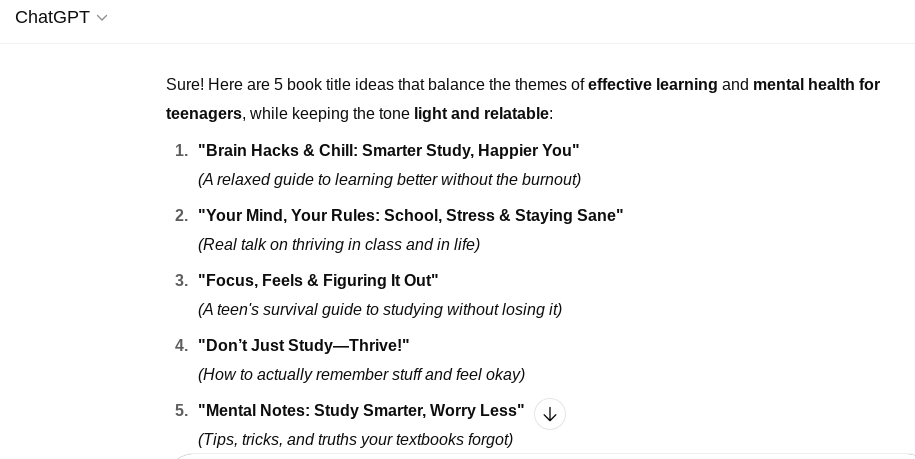
Now let’s see what different book title generators suggest when guided with the same request, so you can judge for yourself which tool seems the most effective and relevant.
Toolsaday provides the users with the most customization opportunities of all the tools in our review. Beyond describing your book, you can pick the genre and tone of voice, submit the keywords, and specify the title style. The tool also suggests choosing the number of titles you get and can generate in different languages.
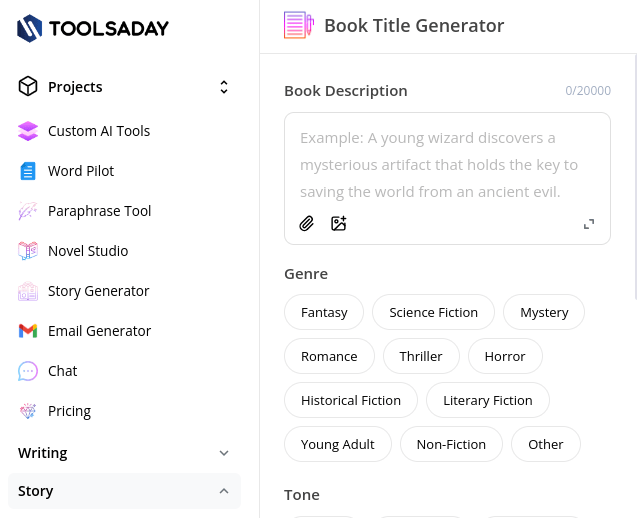
Let’s see how it works with our prompts:

The Canva book title generation tool is super easy to use. You can insert your prompt and get the title variants, just like so:
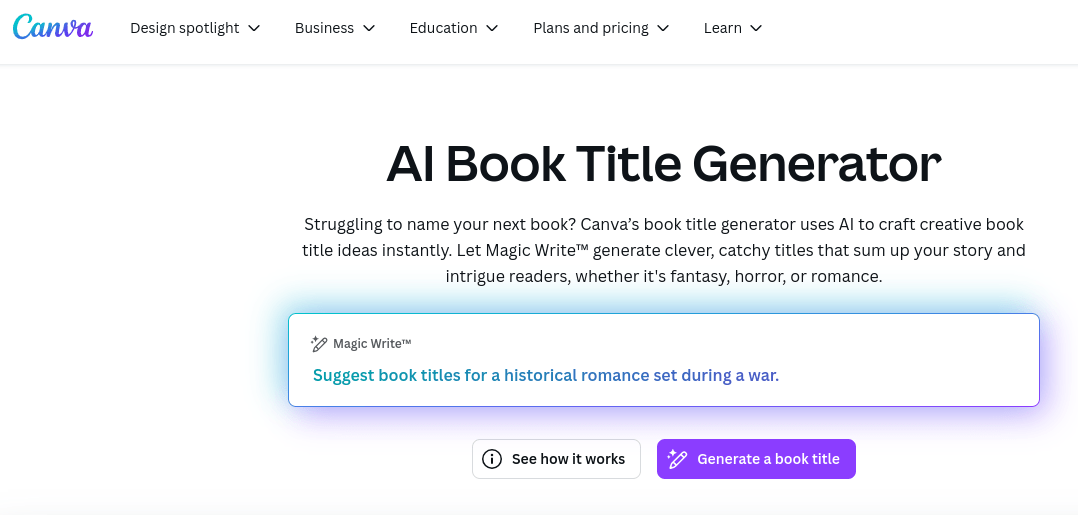
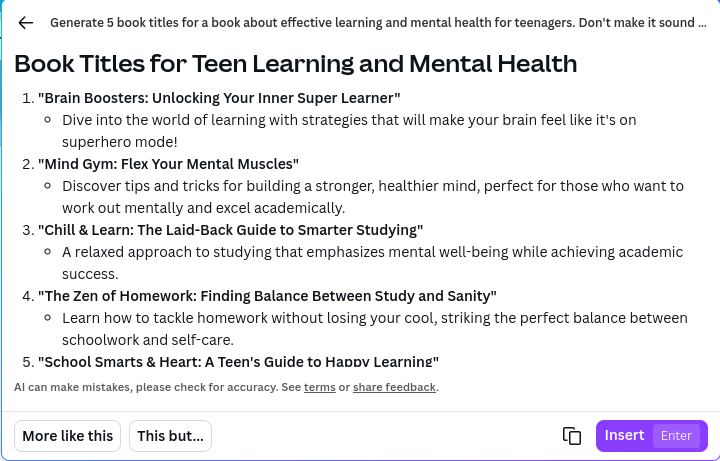
If you want to continue the brainstorming session, just ask for “more like this” or go for the “this but…” option, adjusting your request. Here is the result after asking for “this but more fun”:
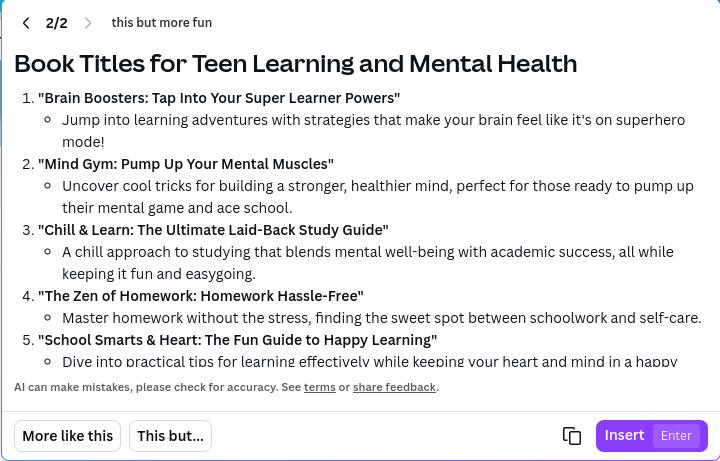
BookRaid allows choosing between a dozen book types. Then you can type the description or a summary of your piece.
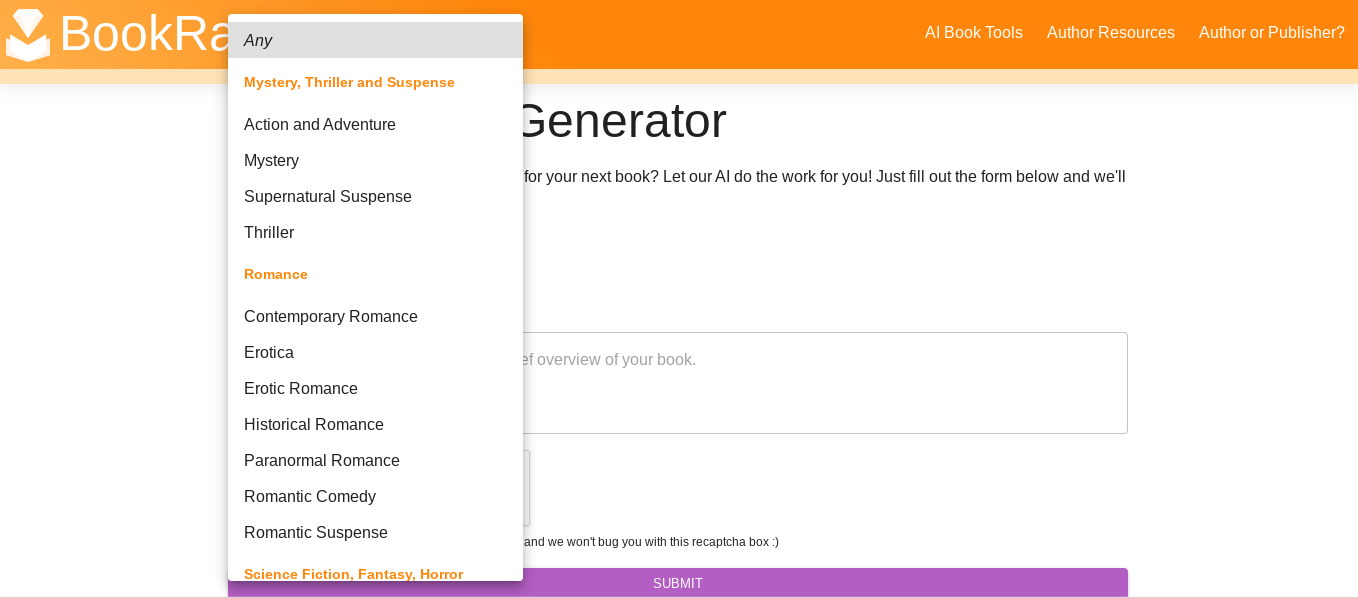
And here is the result for our request:
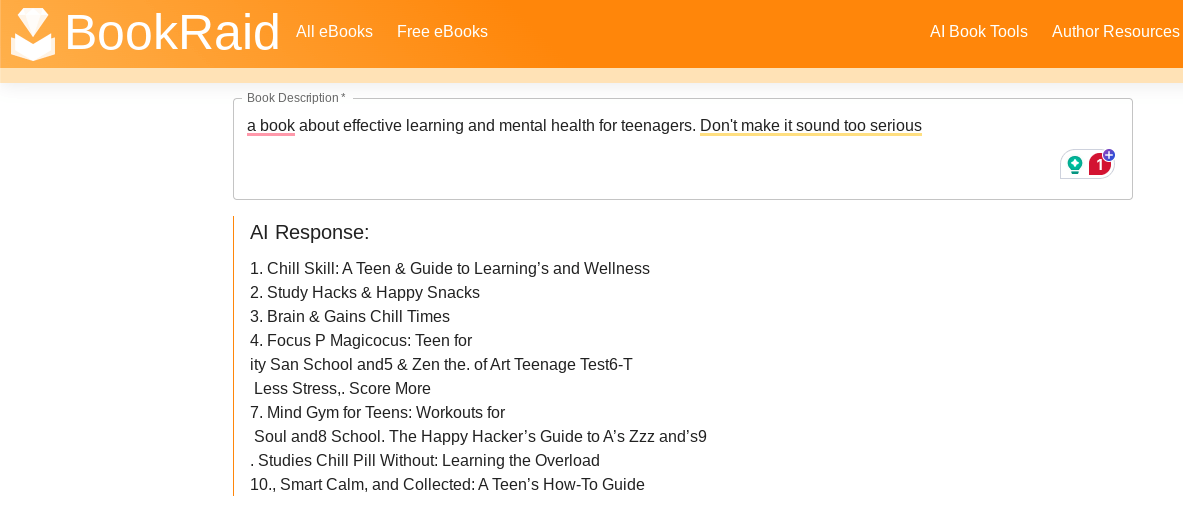
AskYourPDF gives an option of choosing genre, adjusting the mood and tone, and even specifying your target audience. And, of course, you should provide the idea or book description.
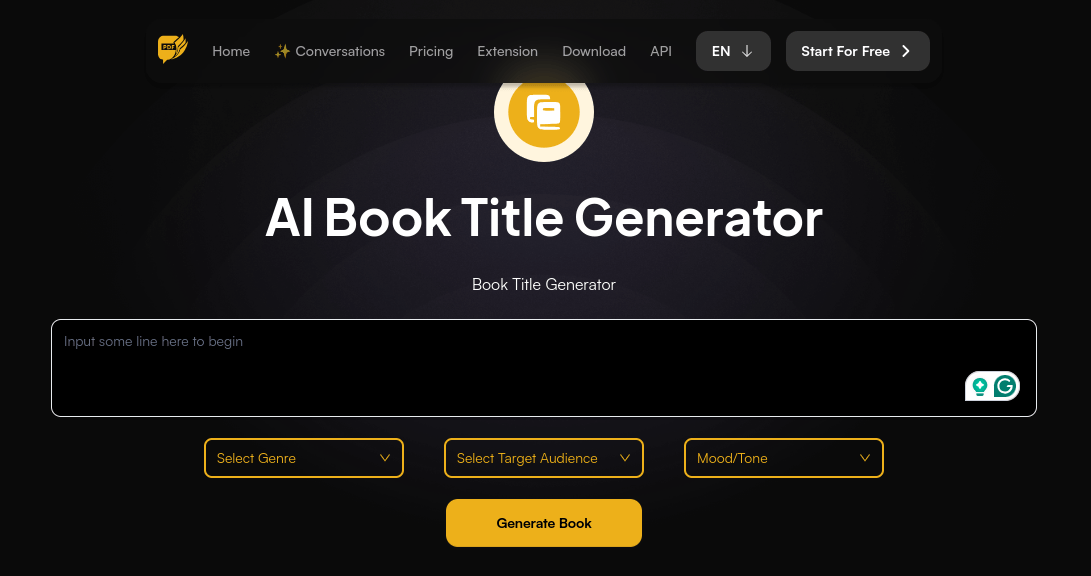
Here are the suggestions we’ve got for our book:
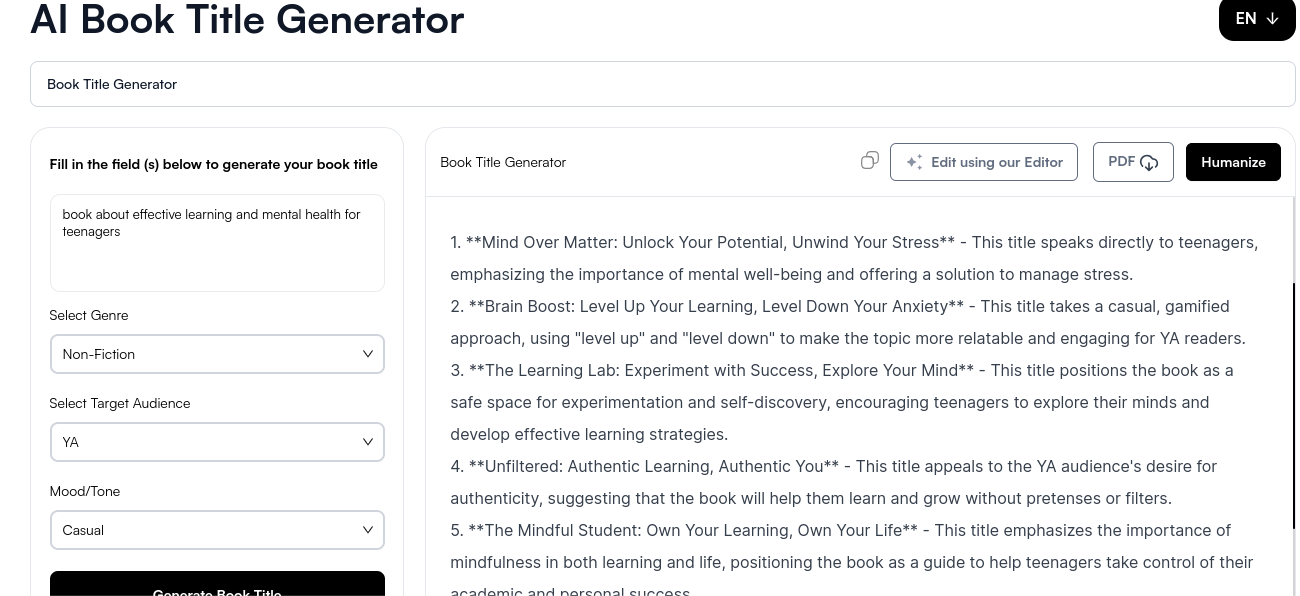
ToolBaz invites you to insert the topic or a summary of your book. Then you can choose between various AI models and versions to get title options.
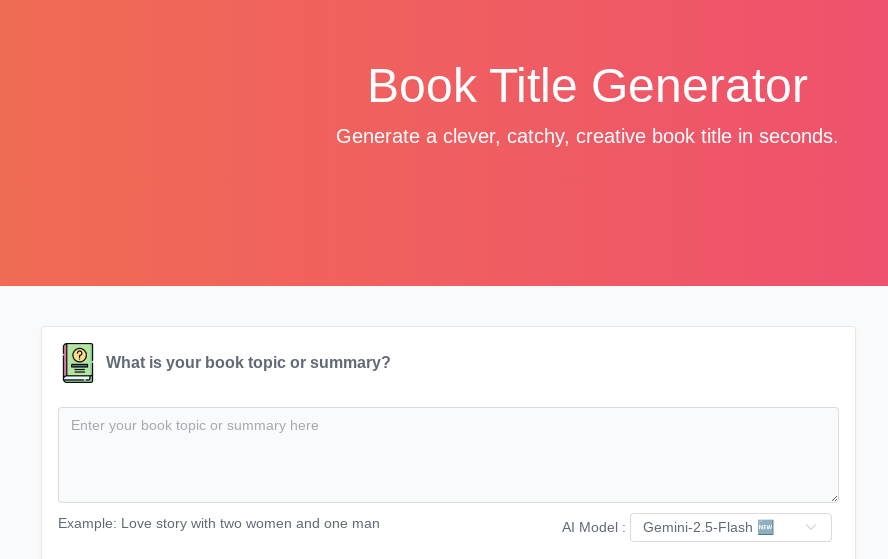
And here’s what we’ve got for our request with the Gemini 2.5 Flash model:
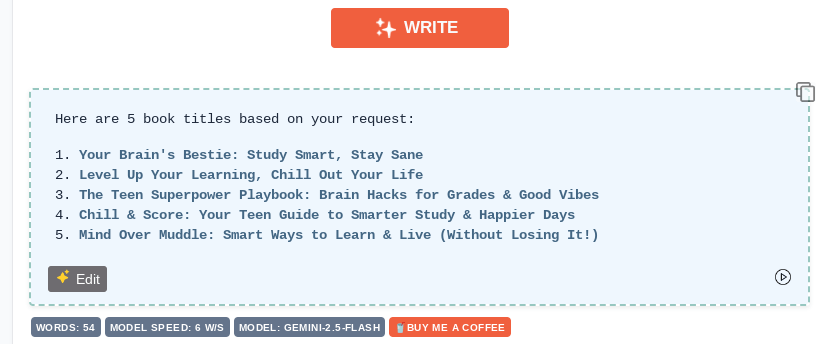
Once you have a title, time for actual writing! Here are some AI tools that can elevate your creative process.
Best for fiction writing
Building new words is challenging. AI tools offer solutions for organizing the creative chaos, delegating routine tasks, and returning to the process its spark and passion.
Sudowrite for exploring plot options and character development
Sudowrite is designed to accompany fiction writing from the first uncertain idea to the final draft. The platform provides the tools for exploring possible plot twists and character growth options, bringing more emotions and visual descriptions, experimenting with style, and helping with word search and editing. It also becomes a writing buddy who is never tired of giving feedback, even on the 2456th draft at 3 am. The tool is no genius and may generate predictable or way-too-dramatic ideas, strongly relies on the author, and the result completely depends on the prompts and the author’s style. So, despite a controversial perception in creative circles, the ultimate solution is always up to the human’s creative judgment, and Sudowrite will hardly replace it. However, it can definitely make the author’s life easier!
Plot Factory for world-building
Plot Factory is a writing organizer that helps to keep your universe in order. A dashboard enables the author literally see the full picture and never lose track of meaningful details. Character sheets, places and objects lists, outline planning–the platform offers a one-stop solution, from inspiring the creative process to managing the word count and giving access to the editor. One can write the story right on Plot Factory and use AI assistance for ideas and name generation when feeling stuck.
NovelAI for sci-fi and fantasy
NovelAI helps to create your story based on the hints you provide, coming to rescue you from writer’s block struggles. The tool shines its best in genres like adventure, sci-fi, and fantasy, and generates plot ideas, character descriptions, and even story segments based on what you have already crafted. NovelAI heavily relies on the prompts and is only as efficient and relevant as they are. So, don’t expect AI to make the story for you–consider it a trusty writing buddy who can brainstorm, suggest ideas, and give a second opinion when you need to pick someone’s brains.
Best for businesses: Jasper
Jasper is versatile: it still performs great for creative writing, but tailors the content to business needs. Whenever you need a blog article, a social media copy, or a fiction piece, the tool will help to adjust it to the brand’s tone of voice and SEO-optimize for the search engines to make the text visible. Jasper is designed to help with storytelling, so you choose your story, and it helps to make the most of it! Being one of the most pricey solutions on the market, Jasper may be more suitable for businesses than individuals and aspiring writers.
Best cost for value: Rytr
Rytr is focused on short-form copy for blogs, ads, and social media, but can also be used for longreads and keyword optimization, helping the content reach its audience. The tool is one of the most affordable on the market, which makes it a good choice for hobbyists and those wanting to try AI-based solutions for marketing their products or building media presence. Rytr also has a poetry generator and is capable of assisting with plot ideas and finding one’s tone of voice. It performs on a more basic level than sophisticated tools, but sometimes it’s all about exploring the options!
Best for marketing: Writesonic
Writesonic is designed to help brands improve their visibility and search engine ranking, which makes it an essential tool for marketing. The platform allows planning, managing, generating, analyzing, and optimizing content, uniting multiple solutions on one platform. Integrations provide even more flexibility: create engaging copy on Writersonic and publish it on WordPress with one button click!
Best for social media: Anyword
Anyword integrates with various platforms, allowing not only the generation of engaging social media content but also the data collection and the performance analysis. The solution is designed for both long-form content and short copy and ads, covering all marketing needs and adjusting the tone of voice and word choice to the brand’s style.
Best for poems
ChatGPT, and specifically the GPT-4.5 model, is known for shining its best in creative writing, human-sounding interactions, and storytelling. These qualities provide a solid basis for expressive and emotionally rich poetic output. The chatbot format accelerates the process and makes the tool versatile and user-friendly: you can adjust the result with prompts and make as many edits as needed for the desired result, changing anything from the topic to the tone of voice.
An experimental tool created by Google invites you to craft a poem resembling the renowned author’s style. At the beginning, Verse by Verse suggests picking three poets who inspire you the most. Then you can select a preferred poem structure, syllable count, and even the rhyme scheme, and then insert the first line to “inspire your muses”, the selected authors, to generate the next line. You can take it from there or ask for further suggestions.
PoemGenerator.io is a tool designed specifically for crafting verses. It is user-friendly, adjustable, and perfectly suits cases when you need a quick result without going into the stylistic depths. Type your theme and keywords, select the type, size, and rhyming pattern, and enjoy the output. You can also fine-tune the details like the tone, poetic devices, and even exclude certain words from the resulting poem.
How to use AI ethically
It’s okay if none of the titles sound like your future bestseller’s cover. AI tools are meant to simplify your workflow, not do your job instead of you. After all, only you know what’s best for your book! Consider the title generator as a brainstorming buddy.
- Filter out the “definitely not”: sometimes the way to know what works starts with finding out what definitely doesn’t.
- Look at the “maybes”: find a pattern that unites them, that’s your direction for further search.
- Trust your guts: look at the titles that sound right intuitively and then analyze what exactly makes them relevant to your book; that might be your key.
- Play with the options: take the variants the generator provides you and continue brainstorming; sometimes a word that seems random saves the day!
Don’t forget to check your writing with an AI detector and plagiarism checker to ensure your text is not only inspiring but also authentic and original! Join educators and students who trust us now.






